
Deli Equipment and Supplies List
Starting a deli can be an exciting venture as you embark on offering delicious deli meats, cheeses, and sandwiches to your customers. To ensure a successful start, it's essential to invest in the right equipment and supplies. Whether you are setting up a new deli or revamping an existing one, having the necessary tools at your disposal is crucial for efficiency and quality in your operation.
Shop All Deli Supplies
Click below to learn more about deli supplies and equipment:
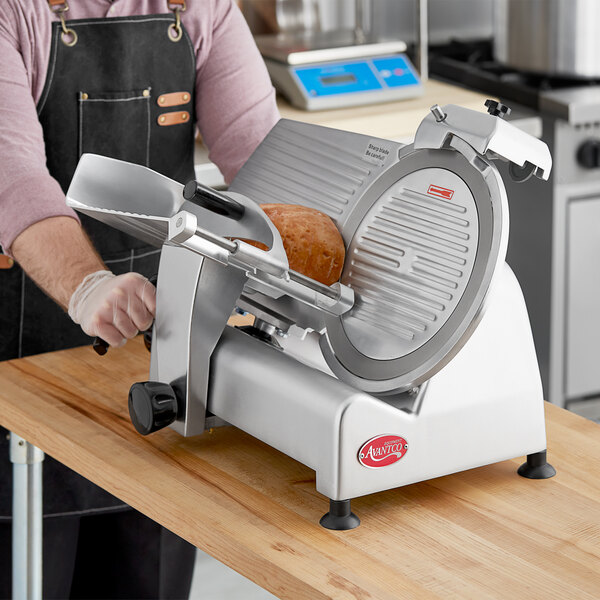
Meat slicers are vital to deli operations because freshly sliced meats and cheeses are the "bread and butter" of your business. A commercial slicer gives you consistent portion sizes and presentation, which helps when weighing out customer orders. You can easily adjust the thickness of each slice to meet customer preferences, whether they prefer thin shavings or hearty cuts.
Here are a few features to consider when purchasing your meat slicers:
- Number of Slicers: For smaller delis or those with lower demand for sliced products, one or two meat slicers may be sufficient. However, larger delis or those with high customer traffic may benefit from having multiple slicers to handle peak periods efficiently.
- Horsepower: The horsepower of a meat slicer determines its slicing power and efficiency. Higher horsepower models are better suited for slicing tougher meats and handling larger quantities. Consider the types of meats you will be slicing and the volume of slicing you anticipate to determine the appropriate horsepower for your needs.
- Usage Volume: Consider the volume of slicing your deli will require on a daily basis. If you anticipate high-volume slicing, opt for a premium meat slicer with a larger blade and more powerful motor to handle the workload efficiently. For smaller delis with lower slicing demands, an entry-level model may be sufficient.
- Manual or Automatic: Meat slicers come in both manual and automatic models. Manual slicers require the user to operate the slicing mechanism by hand, while automatic slicers are equipped with motorized systems for effortless slicing. The choice between manual and automatic will depend on the volume of slicing you need to do and the level of convenience you prefer.
Check out our meat slicers buying guide to learn more about choosing the right unit for your needs.
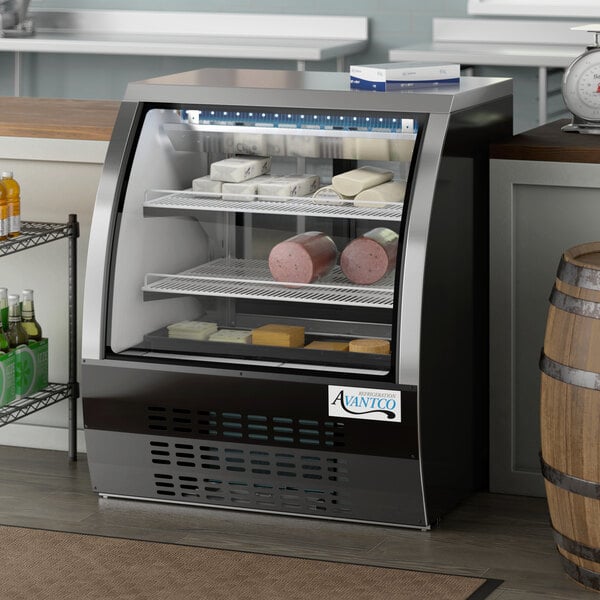
A refrigerated display case is the focal point of your deli. It's where customers will line up to see your offerings, and it's where many of your products are stored. When purchasing a new deli display case, make sure it's the right size for your space. You'll also want to think about the design and aesthetics of the case to ensure it complements the overall look of your deli. Look for features such as adjustable shelving, LED lighting, and easy-to-clean surfaces. These features can make it easier to organize your products, enhance visibility, and simplify maintenance tasks.
Besides display cases, you'll need to invest in other types of refrigeration as well:
- Undercounter Refrigerators: These compact units are designed to fit conveniently under countertops, making them ideal for storing ingredients or prepared food items that need to be kept cool and easily accessible during busy hours.
- Reach-In Refrigerators: These larger units are perfect for storing larger quantities of deli products, such as meats, cheeses, and beverages. They typically have adjustable shelves and temperature controls to keep your items fresh and organized.
- Walk-In Coolers: For larger delis or those with high storage needs, a walk-in refrigerator is essential. These spacious units provide ample storage space for bulk ingredients, prepared foods, and other perishable items, allowing you to keep your inventory well-stocked and organized.
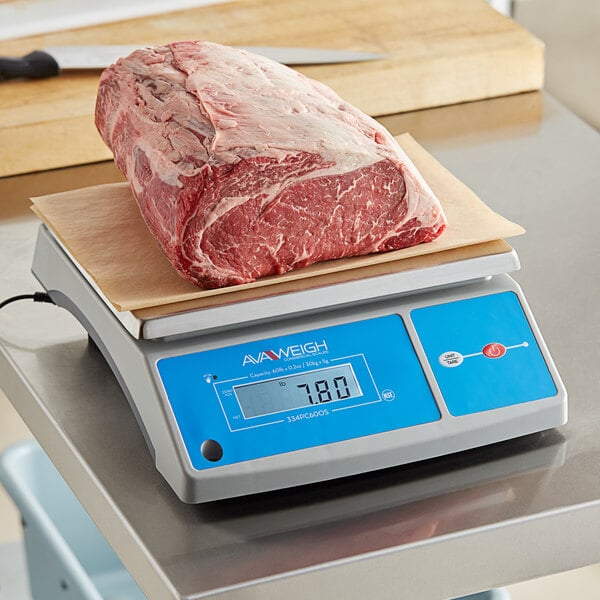
Portion scales are specialized scales designed for accurately measuring and portioning food items. In a deli, where items are often sold by weight, portion scales play a crucial role in ensuring that customers receive the correct amount of product and that inventory is managed effectively.
Before purchasing a deli portion scale for your establishment, there are a few key features to consider:
- Capacity: Make sure the scale you choose has a capacity that meets your needs. Consider the volume of items you will be weighing to ensure the scale can handle the workload.
- Display: A clear and easy-to-read display is important for quick and efficient weighing. Choose a scale with a digital display that is easy to read, even in low-light conditions.
- Tare Function: The tare function allows you to zero out the weight of containers or packaging, so you only weigh the actual product. This feature can save time and reduce waste in your deli operation.
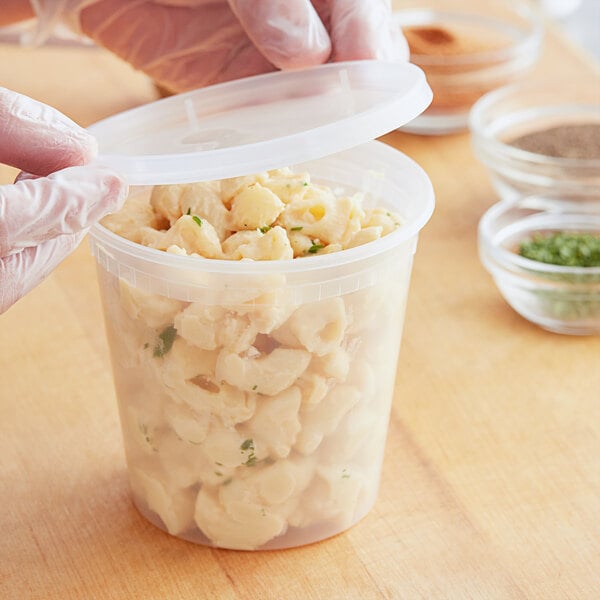
No deli is complete without this highly recognizable item - the deli container. They're sturdy, they have secure lids, and they're made of see-through plastic for visibility. These disposable plastic containers are just waiting to be filled with your finest prepared foods, like fresh cole slaw, homemade macaroni and cheese, or the hot soup of the day. When you're deciding what types of deli containers you want to keep in stock, keep these features in mind:
- Material: Deli containers are typically made from either plastic or compostable materials. Plastic containers are durable and provide a tight seal, while compostable containers are eco-friendly and sustainable.
- Size: Deli containers come in various sizes to accommodate different portion sizes and food items. Consider the types of products you will be storing to determine the appropriate size for your containers.
- Tamper-Evident Design: Opt for deli containers with tamper-evident features to ensure the safety and integrity of your food products. Tamper-evident containers have a visible seal that shows if the container has been opened or tampered with.
- Microwave Safe: If you offer ready-to-eat meals or items that require reheating, select microwave-safe deli containers for added convenience for your customers.
- Freezer Safe: For delis that offer frozen items or need to store products for longer periods, freezer-safe deli containers are a must to maintain the quality of your food.
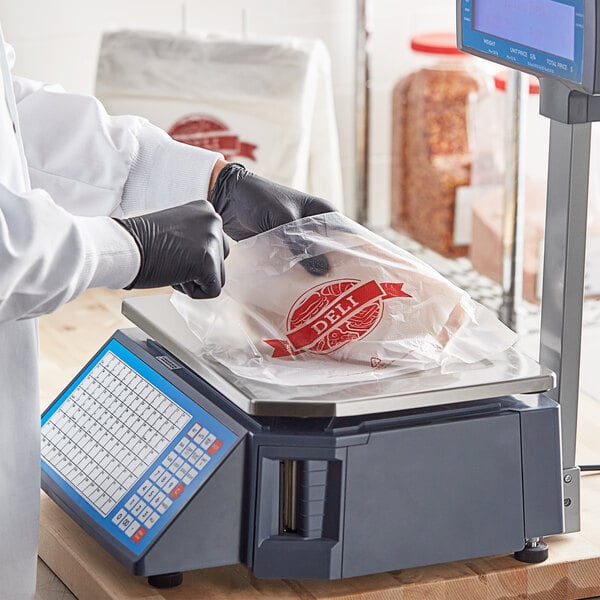
You'll need plenty of packaging options for your sliced meats and cheeses. The right packaging ensures freshness and keeps your products secure while customers transport their purchases back home.
- Saddle Bags: Plastic deli saddle bags are clear, lightweight bags that are designed to package deli meats and cheeses. They are typically open at the top and feature a saddle-shaped design that allows them to easily hang from a saddle bag holder.
- Deli Wrap: Deli wrap is a versatile option for wrapping sandwiches, lining serving trays, or separating slices of cheese and meat. It helps maintain the freshness of your products and is easy to use.
- Aluminum Foil: Aluminum foil is a must-have for wrapping hot sandwiches, baked potatoes, or grilled vegetables. It helps retain heat and moisture, keeping the food fresh until it is ready to be served.
- Plastic Wrap: Plastic wrap is essential for covering deli trays, wrapping sandwiches, or sealing containers. It is a versatile option for maintaining the freshness of a variety of deli items.
- Paper Bags: Paper bags are a classic choice for customers looking to take their purchases to go. They are eco-friendly and provide a convenient way for customers to carry their deli items.
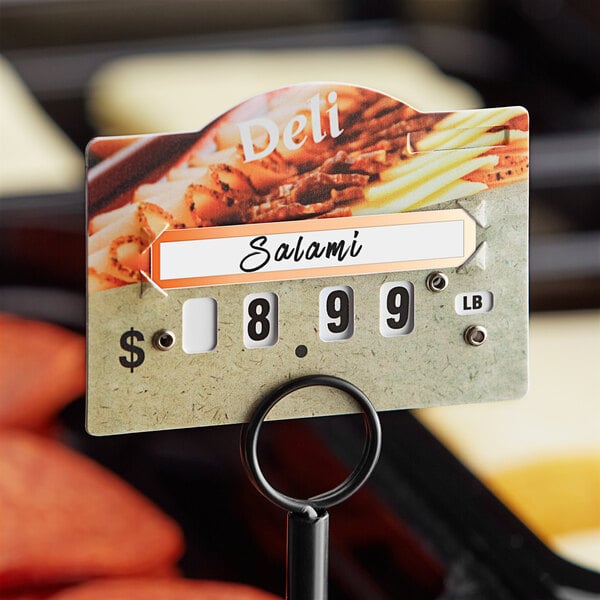
Deli tags are small, often rectangular pieces of paper or plastic that display key information about the deli products in your display case. They typically include details such as the product name, price per pound or unit, any special promotions, and sometimes even nutritional information. These little tags play a big role in deli operations. Here are a few reasons why they're so important:
- Product Identification: Deli tags and labels help customers easily identify different products on display. Whether it's different types of cheeses, meats, or salads, clear labeling ensures that customers can quickly find what they're looking for.
- Pricing Accuracy: By clearly displaying prices on deli tags and labels, both customers and staff can ensure that the correct prices are charged at the register. Tag wheels are a type of deli tag with an adjustable pricing wheel so you can change the price on any item as needed.
- Promotions and Specials: Deli tags and labels are perfect for highlighting promotions, discounts, or special deals on specific products. This can attract customers' attention and drive sales for featured items.
- Food Safety: In a deli setting, it's crucial to provide accurate information about the products being sold, including any allergens or nutritional information. Deli tags and labels can include this important information to ensure that customers make informed choices.
- Efficient Inventory Management: By labeling products with deli tags, staff can easily track inventory levels and ensure that products are rotated properly to prevent spoilage or waste.
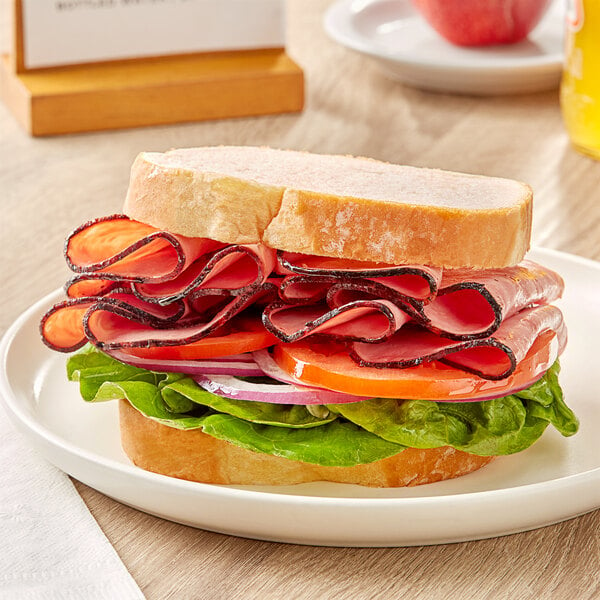
Many delis offer a range of prepared salads and sides as well as serving a menu of sandwiches and subs. From meats and cheeses to condiments and packaging, there are a variety of foods and products that are necessary to keep your deli running smoothly. Here are some key items you'll need to have on hand:
- Deli Meats: A variety of deli meats such as turkey, ham, roast beef, and salami are staples in any deli. These meats can be sliced to order or pre-packaged for quick service.
- Cheeses: Stock up on popular cheeses like cheddar, Swiss, provolone, and mozzarella. These cheeses can be used in sandwiches, salads, and charcuterie boards.
- Bread and Rolls: Fresh bread and rolls are the foundation of any deli sandwich. Offer a selection of bread options such as white, wheat, rye, and hoagie rolls to cater to different tastes.
- Condiments and Spreads: Mustard, mayonnaise, pickles, olives, and various spreads are popular condiments used for adding flavor to sandwiches and wraps. Don't forget to include specialty condiments like pesto, aioli, and horseradish for unique flavor combinations.
- Salads and Sides: Pre-made deli foods like potato salad, coleslaw, and pasta salad are popular choices for deli customers looking for a quick and easy meal.
Back to Top
Related Resources

Guide to Popular Ham Varieties
The term "ham" includes a broad category of meat products typically made from the hind legs of pigs. Butchers preserve ham meats through wet or dry curing methods , which employ salt and other seasonings to enhance the meat's flavor and extend its shelf life. Some hams are further processed by smoking, depending on the desired taste and texture. We explore the most popular types of ham so you can choose the best option for your restaurant. Click below to check out the different types of ham: 1. Prosciutto 2. Pancetta 3. Capicola 4. Canadian Bacon 5. Jamon Iberico 6. Honey Ham 7. Black Forest Ham 8. Country Ham 9. Serrano Ham 10. Smithfield Ham 11. Gammon 12. Ham FAQ Types of Ham Discover the different varieties of ham and what distinguishes

How to Use a Meat Grinder
Meat grinders are convenient pieces of equipment that are most commonly used in settings like delis, butcher shops, and grocery stores. But they are also becoming more popular in restaurants as restaurant owners are finding that meat grinders can help cut food costs . Keep reading to learn why you should get a meat grinder for your business, how to assemble and use your grinder, and some helpful tips for maintaining your appliance. Shop All Meat Grinders and Choppers How to Use a Meat Grinder Video Check out our meat grinder tutorial below: How to Assemble a Meat Grinder When assembling your meat grinder, be sure that all of the components are secured tightly. Additionally, some meat grinders may have slightly different configurations depen
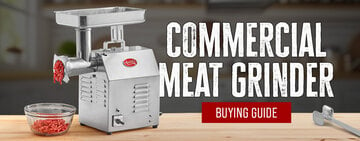
Commercial Meat Grinder Buying Guide
Commercial meat grinders are designed to efficiently grind and process meat, making them ideal for butcher shops, delis, restaurants, and other commercial kitchens. This equipment comes in a variety of sizes and configurations to suit different production needs. From small countertop models suitable for low-volume operations to large industrial-grade machines capable of processing hundreds of pounds of meat per hour, there is a commercial meat grinder to fit every business's requirements. Discover the different types of meat grinders available for your establishment and the various factors you should consider to find the best commercial meat grinder for your establishment: Shop All Commercial Meat Grinders Use the following links to explore
- Topics 1364
- Industrial 55
- Troubleshooting Guides 21
- Restaurant Management 129
- Bar Management 57
- Catering Tips 37
- Bakery Management 42
- Food Trucks & Concessions 49
- Advertising & Marketing 37
- Eco-Friendly Tips 11
- Facility Layout & Design 42
- Coffee Shop Tips 29
- Installation & Maintenance 52
- Janitorial & Pest Control 30
- Safety & Sanitation 88
- Startup Tips 104
- Menu Design 10
- Kitchen & Cooking Tips 84
- Hospitality Management 24
- Pizza & Sandwich Shop Tips 36
- Smallwares 37
- Food Prep 90
- Tabletop Items 17
- Disposables 22
- Calculators & Tools 6
- Consumables 52
- Warewashing & Laundry 19
- Cooking Equipment 92
- Food Storage & Refrigeration 51
- Beverage Equipment 35
- Office Supplies 6


